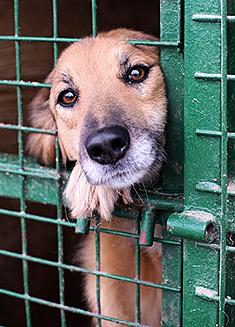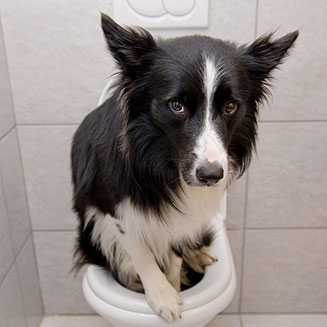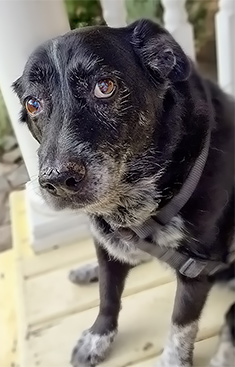Finding a Pet Sitter for Your Dog
Whether you're planning a trip for business or for pleasure, there will be times you just can't bring your dog along. You have several options such as taking the dog to a boarding kennel or leaving him or her with friends or relatives, but your dog may feel best if left in a familiar environment. So how do you find a reliable sitter?
Identifying Need
The first step in locating a sitter is to define what you want the sitter to do, based on your dog's needs. For example, if you have a puppy, you will likely want someone to stop by every few hours to let the small-bladdered dog outside. If you have a very active dog, you will want someone who will take the dog to a park or go on long walks every day. An elderly dog might want someone to just sit in the house with him and keep him company.

In addition to factors such as your dog's age and activity level, think about how your dog interacts with the people you bring into your home. If your dog takes a long time to warm up to strangers, you may want to find a sitter your dog already knows or you may want to invest in some introductory sessions before you leave town.
Are there any people your dog doesn't like? For example, my dogs often become upset by people wearing hats. Other dogs don't like men or children or people who smoke or those who have any number of other characteristics. You want to pick someone who doesn't make your dog nervous so give some thought to how the animal has behaved when strangers come to the house. Does the cable guy set him off? What about the Avon lady? Is he scared of any of your relatives or friends?
Personal factors for you
Once you have identified your dog's needs, spend a little time thinking about your personal concerns. Obviously, you will need to trust the person with whom you are entrusting not only your dog but also your house keys. If you don't have a friend or relative to take care of your dog, you will want to find out if your pet sitter is bonded.
A person who has been bonded has had a thorough background check performed by the bonding company. In addition, if the sitter steals anything from you, the bonding company will pay you for the value of the item(s) up to the bond's limit.
Another factor that might be important to you is whether or not the sitter will be serving you exclusively during the time you are gone, or whether he or she has several clients and will only be available for a limited amount of time. If it is important to you that the person stay overnight with your dog, you will likely want someone who is not committed to other families at the same time.
Consider what other tasks you will want the sitter to perform. For example, if you are looking for someone to care for your plants as well as your dog, you might want to ask prospective sitters about their luck with plants. If you expect housekeeping, you will want someone who is not a slob. If you expect lawn care, you might want to see if they know how to handle a mower. Make a list of any tasks you expect to ask the sitter to do so you don't forget to ask about them when you interview candidates.
How much should you expect to pay a pet sitter?
The short answer to this question is, "It depends." Like just about everything else, if you live on the coast, you will pay more for a pet sitter than you will if you live in the center of the country. For example, Pet Au Pair in Cary, NC quotes a price of $18 per day for up to two dogs. On the other hand, Pet Sitters of America charges as much as $15 - $17 per visit.
Another factor that influences cost is the level of service you want. If you simply want someone to feed your dog and let him or her out twice a day, you can expect to spend $5 to $10 per day. If you want someone to spend a certain length of time on each visit, the price will go up. If you want walks, that may add to the cost, unless the sitter just considers that part of spending time with your dog. If you expect the sitter to take the dog to the park or to provide transportation to day care, the groomer, or a pre-existing vet appointment, you should expect to pay mileage costs.
If you are working with a professional sitter, chances are you will be expected to sign a contract. Make sure the specifics are spelled out in the contract, such as length of visits, number of visits per day, services to be performed, and any restrictions you have. For example, if you don't want your dog to ride in a car without a crate or safety restraint, put that in the contract.
Have a back-up plan for emergencies. For example, what will the sitter do if your dog gets sick while you are away? You may want the dog taken to an emergency vet or to your regular vet. You may have a preference, for an older dog, that no extraordinary measures be taken. You may have a dollar limit, above which no care should be attempted. It's hard to break this down into a dollar and cents equation, but vet care for some conditions can quickly top $1,000, and if this will break your budget, you need to be realistic about the fact that you need to eat and provide shelter for yourself and your family for the next few months. Check out our blog for some advice from vets on having a pet sitter care for a sick dog.

The Kid across the Street
Don't discount the value of a young teenager in looking after your dog. If your dog already has a relationship with the youngster, he or she may be the best fit for a pet sitter. A child in his or her young teens is old enough to know that money is important but not old enough to have much money in his or her pocket. Which means that the opportunity to earn a little income as a pet sitter will be very attractive. Young teens often haven't reached the point where they have something going on after school every day, so they will have time to walk your dog and spend some quality time with the animal.
If the child is younger than 16, you will probably want to talk to the kid's parents before you speak to the kid. Ask if they think their child is mature enough to handle the responsibility, and whether or not they are willing to help out if problems arise.
No matter who you choose as a pet sitter, make sure you invite the person over a time or two before you leave town. Have the person interact with your dog at playtime and at mealtime as you explain your regular routine. Make sure your dog is comfortable with the person you select. Dogs usually have a good sense of "good" people and will let you know if they are uncomfortable with your selection.
Doggies Den: Latest Articles
 Homemade Thanksgiving Treats for Your Dog
Homemade Thanksgiving Treats for Your Dog
NUTRITION We all want to include our dogs in our holiday celebrations, but hopefully, you're aware that sharing table scraps with your dog isn't always the best idea.
 Keeping Your Dog Safe during the Summer Months
Keeping Your Dog Safe during the Summer Months
HEALTH Summer is coming on fast, so it’s time to plan how you will keep your dog safe and healthy through the lazy, carefree, warm days.
 Vaccination Time Again-Keeping Your Puppy Healthy
Vaccination Time Again-Keeping Your Puppy Healthy
DOG HEALTH So you have your new puppy picked out. There are quite a few shots, treatments and examinations that will keep the newest member of your family healthy.
 Canine Thanksgiving Feast
Canine Thanksgiving Feast
NUTRITION With the wide variety of food at Thanksgiving dinner, chances are you'll want to give your dog something special, too. If you're contemplating what to feed your dog for the holiday, here is a guide to a great Canine Thanksgiving Feast.
 Dog Walking Tips Every Owner Should Know
Dog Walking Tips Every Owner Should Know
DOG FUN Walking your dog is not only crucial to keeping him healthy and happy, it strengthens the bond between your canine friend and his caregiver. There are a lot of obstacles out there. Don’t forget these simple tips to keep your walk fun and safe in the outside world.
 The Benefits of Physiotherapy for your Dog
The Benefits of Physiotherapy for your Dog
HEALTH The same techniques that physiotherapists use to treat a variety of injuries and conditions in humans have been adapted to suit animals with great success. Family pets, show dogs, and working dogs can all benefit greatly from physiotherapy. Dogs whose activities involve a lot of agility are especially susceptible to the types of problems that physiotherapy can address.
 The Decision- Adding a Dog to Your Family
The Decision- Adding a Dog to Your Family
FIRST TIME OWNERSBringing a dog into your family is a decision where many people don’t realize it’s magnitude until after they have the dog. There are a number of things that you need to research before you decide to purchase a dog, and it starts right in your own home.
 Bringing Your Dog Into Your New Baby's Life
Bringing Your Dog Into Your New Baby's Life
HEALTH Many believe that a dog and a new baby cannot happily coexist, so therefore the dog has to go. This is not necessarily the case.  A new baby does not mean you have to abandon your dog.

Doggies Den:
Most Popular Articles

Dog Pregnancy Symptoms
HEALTHIf you suspect your dog might be pregnant, check out part one in this series on pregnant dogs, where we cover pregnant dog symptoms.

Dog Birth
HEALTHIn the third article of our dog pregnancy series, we look at the wonderful, but messy, process of bringing newborn puppies into the world.

Indoor Dog Potties
DOG PRODUCTSIt's been a long day at work. You were so busy, you didn't even take time to eat a sandwich, let alone run home to let your dog out. You're on your way home, knowing the poor dog is crossing his or her legs by now, when your car breaks down, delaying you even further. Can't somebody make this easier?

Your Dog’s Digestive System
PHYSIOLOGYEver wonder why your dog eats so fast? Or why he eats gross things? Or why he gets sick to his stomach? Or why his waste stinks so bad? Some of these things are normal, some are not.

Canine Respiratory System
BREATHINGThe basic function of your dog's respiratory system is to bring oxygen in to and remove carbon dioxide from the body. Knowing the symptoms of respiratory diseases can help you help your stay healthy.

Shelter Dog Adoption Tips for Success
ADOPTION Are you intimidated by the prospect of "rescuing" a dog from a shelter? One reason that you may be wary of adopting a dog from a shelter is not knowing how to choose. Adopting a dog from a shelter can be a rewarding process, if you're prepared to do a reasonable amount of research.

Canine Urinary Tract Infections
SYMPTOMS AND TREATMENTDoes your dog seem to be having trouble relieving his or her bladder? Learn how to recognize the signs of urinary tract infections and how to treat them before they spread.

What to do for Dog Diarrhea
SYMPTOMS AND REMEDIESIf you have dogs in your house for any length of time, you have likely experienced at least one bout of dog diarrhea. Beyond the pain in the tuckus involved in cleaning up the mess, you should know what causes diarrhea, and when it's important to see the vet.

What to do for a Dog Bite
DOG BEHAVIOR Getting bitten by a dog can be scary, and you may be tempted to run around in circles for a while, trying to figure out what to do. Here's our guide to help you manage the situation.

Top Ten Tips for Living with a Senior Dog
DOG HEALTH Bringing home a new puppy is so exciting, but it doesn’t take all that long for your exuberant puppy to grow into a senior dog who may have special needs. Here are the doggies.com top ten tips for taking care of your companion who has been with you through so much.
